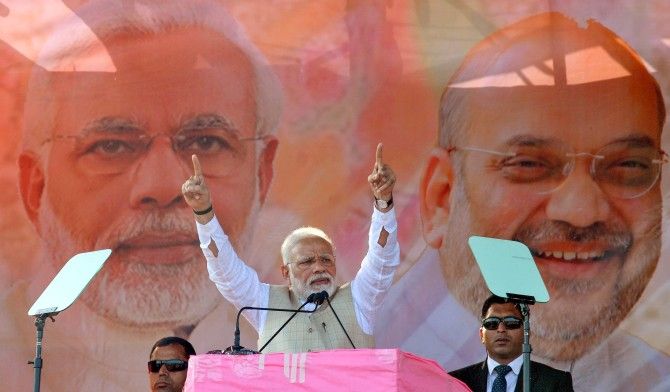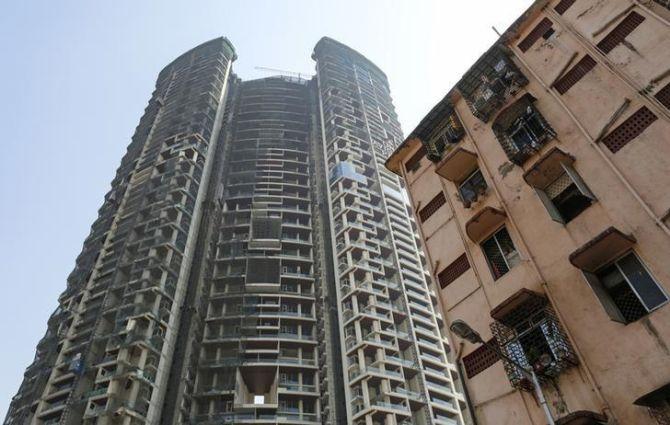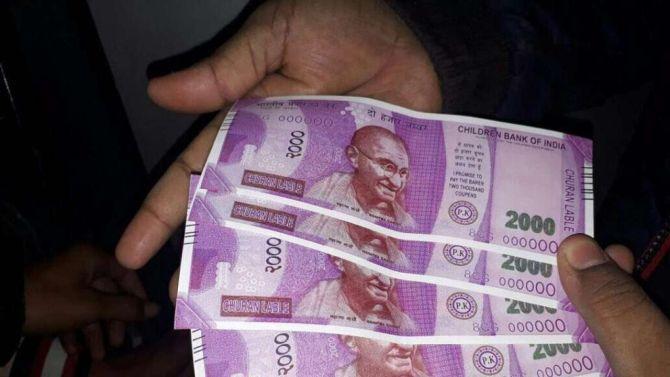Even if the same party returns to power, what is important to debate is that having introduced an entitlement, how challenging it is to reverse such decisions, says Mukesh Butani.

'This is not merely an Interim Budget, but a medium of the country's development journey -- FM'
In line with successive finance ministers who have presented an interim Budget, the vote on account for 2019, as presented by the interim finance minister (FM) is no different.
High on sloganeering, the FM highlighted achievements of the Narendra Modi government, trends on increase in tax base laying down 2030 vision as to where the Indian economy could possibly be heading in the next five to eight years estimating it to touch $5-10 trillion, respectively.
Highlighting accomplishments of the government's flagship schemes, the focus clearly was to continue pursuing transparency agenda be it by way of disruptive policy moves such as demonetisation or enforcement of tough laws such as Fugitive Economic Offenders Act, etc.
On predictable lines, rural distress appeared on top of the agenda, with FM using the term kisan or 'farmer' over 30 times in his speech.
The focus was to address agrarian crisis that I expected to have been achieved by capital investments; instead dole outs were announced -- a short term approach to revive the fortunes of a segment of the economy whose share in the GDP basket is witnessing consistent decline.
On broader policy aspects, there was a little of everything including for youth, women, national security, MSMEs, labour, etc in the Budget.

Though only two pages were devoted to Part B of the speech, which dealt with tax proposals, an important announcement was on the digitisation project, Cabinet approval for which came a fortnight ago.
As a background, in 2009, the Department of Revenue, Income Tax in particular, embarked upon setting up a Central Processing Centre in Bengaluru to streamline the process of granting automated tax refunds.
The Budget announcement and Cabinet approval, rebranded as 'Integrated E-Filing and CPC 2.0', has increased the allocation three times.
The underlying objective being faster and accurate outcome for taxpayers, improving taxpayer awareness and education, e-assessments, etc besides accuracy to process tax refunds.
The digital drive is expected to roll out international best practices encouraging faceless and paperless interaction with the taxpayer.
This move will have far reaching impact on digitisation of records including real time data analytics for the administration to monitor taxpayer trends.

An important highlight of direct tax proposals included focus on real estate sector, particularly for low housing projects.
Besides extending the sunset clause for tax exemption by a year, which was expiring on March 31, 2019, developers who were paying taxes on notional rent for unsold inventory have been exempted for a period of two years.
This has been a long-standing demand of real estate developers.
Following this trend, individuals with second residential house are exempted from taxability of such notional rent.
Similarly, though the overall limit of Rs 2 lakhs deduction towards housing loan remain unchanged, such benefit shall extend to second residential house.
Lastly, capital gains exemption up to Rs 2 crores by way of investment in the second residential house has been introduced.
The overall impact of tax proposals, insofar as, the housing sector is concerned shall positively impact segments that support the sector.
Cement, steel, paint, housing finance companies would benefit from these proposals.

The rebate for individual taxpayers is not as bold as it looked when it was announced.
It will benefit only if the taxable income is less than Rs 5 lakhs with relief of roughly Rs 900-1,000 per month.
The enhancement of withholding tax on bank interest and rentals shall save marginal taxpayers from the burden of compliance and seeking tax refunds, besides freeing up the tax administration's machinery to focus on important tasks.
Increase in standard deduction for the salaried class from Rs 40,000 to 50,000 and gratuity exemption from Rs 10 lakhs to 30 lakhs again is targeted to enhance disposable income of citizens.
The Budget documents on tax revenue receipts reveal a 13 per cent budgeted increase in Corporate Tax collection over the current fiscal year on the back of 17 per cent expected to be achieved for this year.
The individual tax collections that have shown an impressive trend of 23 per cent in the current year is estimated to increase by 17 per cent in the next fiscal year.
Not surprising, the goods and service tax target has been revised downwards by Rs 1 lakh crore in light of subdued collections, though estimated to increase by 18 per cent in the next fiscal year.
These are bold bets, and I guess, that's how the fiscal math adds up to.
The guiding philosophy on fiscal deficit target could be, "We shall cross the bridge when and if we get there".
Though this is a challenge for every new government, even if the same party returns to power, what is important to debate is that having introduced an entitlement, how challenging it is to reverse such decisions! Better leave this to the wisdom of economists!!
Mukesh Butani is managing partner, BMR Legal.












 © 2025
© 2025